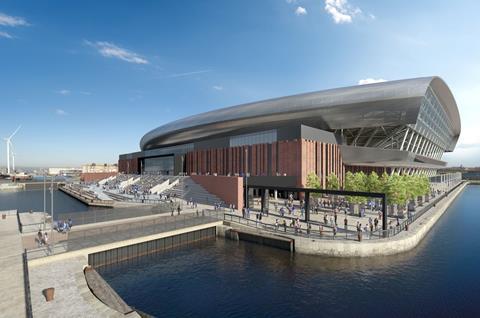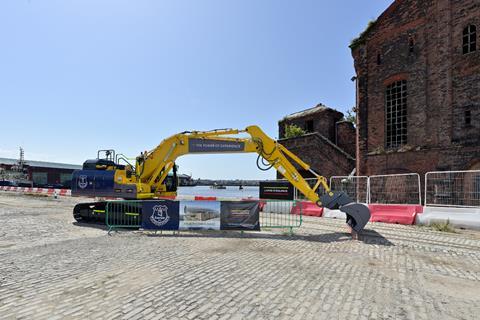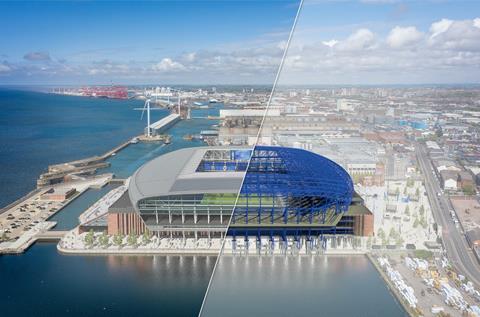Official construction start comes three weeks after Unesco stripped Liverpool of its World Heritage Site status

Construction has officially started on BDP Pattern’s £500m Everton stadium three weeks after it was held partly to blame for Liverpool losing its Unesco World Heritage Site status.
An Everton-branded excavator made the first incision into the eastern quayside of the grade II-listed Bramley-Moore Dock this morning at an event attended by the club’s chairman Bill Kenwright and senior construction staff.
When the 53,000-seat stadium is complete, the historic dock will be almost completely infilled with half a million tonnes of sand.
Hailing the ground-breaking as a “momentous day”, Kenwright said: “To know that Evertonians and the people of this great city are together with us on this journey is a special feeling.
“Now that the work has commenced we can all watch our magnificent home as it comes to life.”

The initial enabling works will prepare the ground for what will become the stadium’s Fan Plaza, which will welcome more than 9,000 spectators on match days.
Everton said that work is already underway to “repair and preserve” the dock wall, to stabilise a listed hydraulic tower on the site and to prepare for the demolition of unlisted structures including a two-storey warehouse building.
The scheme, which was designed with US practice Dan Meis with Pattern and is being built by Laing O’Rourke, is the largest single-site private sector development in the UK.
But its location and size has proved highly controversial and was deemed “completely unacceptable” by Unesco a month before the body announced its decision to strip Liverpool of its World Heritage Site status.
In a report in June recommending the move, Unesco said the scheme would have a “major adverse impact on the authenticity and integrity” of the area and showed the city council’s “lack of commitment” in protecting the dock.
But Everton chief executive Denise Barrett-Baxendale said today’s event was the culmination of an “extensive and robust planning process” which provided an exciting future for the club.
And in a comment piece published on Building Design’s sister title Building today, Liverpool mayor Joanne Anderson said she found it “incomprehensible” that Unesco would prefer that Bramley Moore Dock remain a “derelict wasteland” rather than be regenerated.
>> Also read: Liverpool’s mayor unrepentant over Unesco decision

The city’s north docks, which is also the site of another Unesco-baiting scheme, Peel’s £5bn Liverpool Waters masterplan, is one of the most deprived areas in the UK.
BDP Pattern principal and chair Dipesh Patel said that the effect the stadium will have on its regeneration “cannot be underestimated”.
He added: “As well as being an amazing place to enjoy football, the new public spaces will be a significant addition to the urban fabric of the city.”
The stadium has not proved a hit with all architects, with Sean Griffiths, co-founder of defunct practice Fat, describing it as like a “spaceship from a 1930s Flash Gordon episode that’s landed on a warehouse roof”.
It is the first major UK project for Pattern, which was snapped up by BDP at the beginning of July.
The acquisition of the practice, which has 40 employees, puts BDP within striking distance of being crowned the UK’s biggest practice in Building Design’s annual WA100 report behind Foster & Partners.
















1 Readers' comment